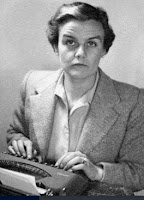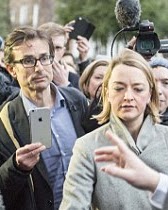Independent founder Andreas Whittam Smith in the last print issue: "I had enunciated at the beginning: 'no profits, no independence'. Until one day, just minutes after I had been discussing the newspaper’s good performance with our finance director, The Times made an announcement that was to change everything. The newspaper would conduct an experiment. It would reduce its cover price in certain parts of the country to see how much circulation would benefit. We had overtaken The Times and this was the response. In September 1993, the trial was declared encouraging. The cover price of The Times was reduced from 45p to 30p. The effect on The Independent was drastic. Either we maintained our cover price and saw our circulation collapse. Or we matched the price cut and saw our profits disappear. In the event, we did both – and suffered both."
The Independent in its last editorial in its final print edition: "Today the presses have stopped, the ink is dry and the paper will soon crinkle no more. But as one chapter closes, another opens, and the spirit of The Independent will flourish still. Our work goes on, our mission endures, the war still rages, and the dream of our founders shall never die."
Alastair Campbell interviewed in the Independent: "What concerns me is that the Independent is going, and there are job cuts at the Guardian, but the wretched Daily Mail is still rampant, making lots of money by millions of people clicking on pictures of cellulited women. I think that’s sad."
Simon Kelner in the Guardian: "In some ways, the Independent always was a virtual newspaper. It never had its own vans, it never had printing presses. But it had a soul that was real, and a spirit that was tangible. The Independent’s greatest challenge is to ensure these survive its latest transition."
Howard Jacobson in his final Independent column: "What’s wrong with the social media can be simply stated. In the heat of violent exchange, everything but opinion gets lost. A generation has grown up that – online, at least – is deaf to tone, impervious to irony, incapable of grasping that thought can be tentative and argument exploratory. Theirs is a battleground of stated positions. One view lowers its head and charges its antlers at another. All we can hope is that in time they will all have butted themselves into unconsciousness."
Louis C.K. quoted by Esquire: "Internet news is heroin. Newspaper news is nutrition."
Standard & Poor's on Johnston Press in the Telegraph: “The group continues to suffer from the structural decline of the print newspaper industry, in particular print advertising, and of circulation. At the same time, the group's digital operations have been expanding slower than we previously anticipated because of difficulty in deriving revenue from the growing digital audience.”
Guardian readers' editor Chris Elliott in his last Open door column on the use of a front page picture of two women victims of the terrorist attack in Brussels (above): "It is important to tell the story honestly, even if that means using difficult images. I think the Guardian was right to use that picture last week. This was debated at the Guardian’s morning conference, where opinion was divided. However, as I wrote in my replies to readers’ emails: 'It was the terrorists, not the photo, that took her dignity'.”
Howard Jacobson in his final Independent column: "What’s wrong with the social media can be simply stated. In the heat of violent exchange, everything but opinion gets lost. A generation has grown up that – online, at least – is deaf to tone, impervious to irony, incapable of grasping that thought can be tentative and argument exploratory. Theirs is a battleground of stated positions. One view lowers its head and charges its antlers at another. All we can hope is that in time they will all have butted themselves into unconsciousness."
Louis C.K. quoted by Esquire: "Internet news is heroin. Newspaper news is nutrition."
Standard & Poor's on Johnston Press in the Telegraph: “The group continues to suffer from the structural decline of the print newspaper industry, in particular print advertising, and of circulation. At the same time, the group's digital operations have been expanding slower than we previously anticipated because of difficulty in deriving revenue from the growing digital audience.”
Guardian readers' editor Chris Elliott in his last Open door column on the use of a front page picture of two women victims of the terrorist attack in Brussels (above): "It is important to tell the story honestly, even if that means using difficult images. I think the Guardian was right to use that picture last week. This was debated at the Guardian’s morning conference, where opinion was divided. However, as I wrote in my replies to readers’ emails: 'It was the terrorists, not the photo, that took her dignity'.”















































